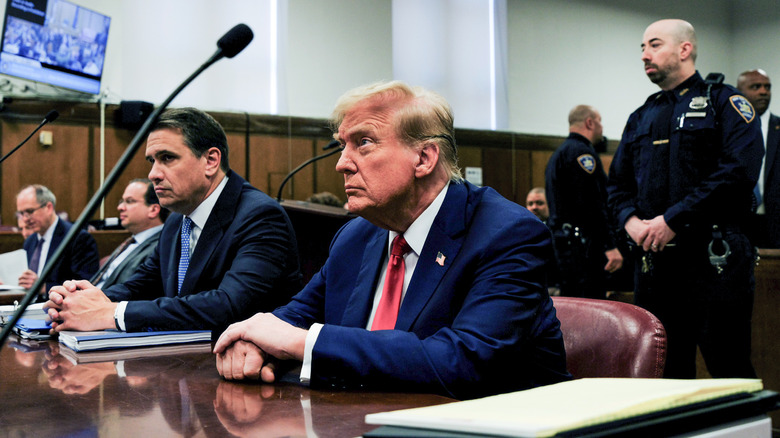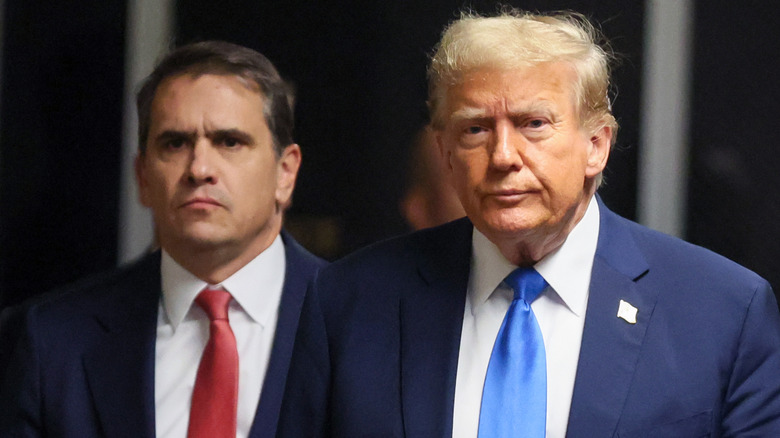If Donald Trump Goes To Prison, Will The Secret Service Tag Along? Here's What We Know
Donald Trump is currently involved in a criminal trial in New York that encompasses 34 felony charges and a potential penalty of incarceration if found guilty. Trump's body language is communicating his stress during the proceedings, and he's not the only one who's agitated about the implications of a former president facing criminal charges. To complicate matters further, there's also the question of whether Trump could be penalized for not adhering to a court-mandated gag order. However, Trump violated a gag order during his October 2023 New York civil trial and wasn't imprisoned for these transgressions.
While the judicial process will take time, and there's a lot of variability in the potential sentencing if Trump's convicted, individuals have been carefully considering all possible outcomes. In the event that Trump were sentenced to prison for any length of time, he would receive Secret Service protection. In these circumstances, various agents would trade-off to provide security services around the clock.
Since Trump is involved in multiple criminal proceedings, this speculation surrounding security and incarceration has been going on for a while. Although the possibility raises concerns about potential difficulties, it's also possible the situation might be more streamlined. "The absence of travel means logistics get easier, and confinement means that the former president's location is always known," Jonathan Wackrow, a former Secret Service agent, explained to The Washington Post in August 2023. "Theoretically, the perimeter is well fortified — no one is worried about someone breaking into jail."
Trump could opt out of Secret Service protection or laws could change
Donald Trump has been involved in quite a bit of drama in his relationship with the Secret Service. Some of his requests to this security agency, like pricey hotel accommodations and extra protection for family members, have cost taxpayers a lot of money. While Trump is entitled to lifetime Secret Service protection, policies involving this agency and the presidency continually evolve. A 1958 law providing lifetime security for past presidents was shortened to ten years in 1994. Then, in 2013, the law changed back to the original lifelong timeframe. However, former chief executives do have the option to waive this Secret Service protection if they desire.
In addition, there's also the possibility that, if incarcerated, Trump might lose his right to Secret Service security. Congressman Bennie Thompson has proposed legislation that could rescind Trump's Secret Service detail if he were convicted of a felony and sentenced to jail for a year or more. "Current law may serve as an impediment to the equal administration of justice and present logistical difficulties for both the Secret Service and prison authorities at the Federal and State levels," Thompson explained to Newsweek.
Even so, maintaining Secret Service protection could be necessary if Trump is imprisoned. For instance, he could potentially face threats to his safety from within the facility. To further protect him, officials might house him independently as an added security measure.
A number of Secret Service Agents could be required in a prison setting
Hypothetically speaking, if Donald Trump were convicted in his New York criminal trial and required Secret Service personnel in prison, agents might have a variety of job duties. "There wouldn't be a Secret Service agent inside his cell, but I expect that there would be two agents outside of his cell, two agents in the corridor leading up to the cell block and another two agents at the entrance to the prison," author Ronald Kessler explained to How Stuff Works. Concerns about Trump's safety in a prison setting could also mean that Secret Service would need to check his meals for any potential concerns.
However, given that this is a brand-new scenario for the agency, it's unclear what actual plans would look like if they were required. In addition, the Secret Service has a policy of not divulging its techniques for particular security scenarios.
There's also the possibility that the Secret Service could choose to outsource part of its duties to another governmental agency directly affiliated with prisons. Then again, there's the prospect that this scenario won't come to fruition. If convicted, the extent of the penalties, including potential jail time, will be at the judge's discretion. "With a defendant who has no prior criminal record, my absolute expectation would be a sentence of probation," Mitchell Epner, a New York lawyer, surmised to USA Today.


